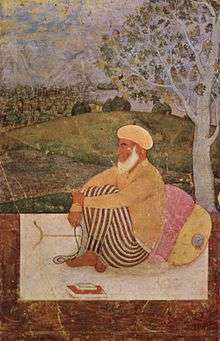Chilla (retreat)
Chilla (Persian: چله, Arabic: أربعين, both literally "forty") is a spiritual practice of penance and solitude in Sufism known mostly in Indian and Persian traditions. In this ritual a mendicant or ascetic attempts to remain seated in a circle practicing meditation techniques without food for 40 days and nights in imitation of the Arba'een.[1][2] The word chilla is derived from the Persian word chehel "forty".[3] Chilla is commonly performed in a solitary cell called a chilla-khana.

In music
A practice similar to chilla is also performed by Hindustani classical music practitioners at an advanced level. It is called chilla katna. The musicians lock themselves up in a chilla-khana for forty days and practice their instrument severely. A special diet, often omitting meat and grains, is taken during this period and very little food is eaten. Any contact to the outside world is avoided during this period. People try not to fall asleep at any cost, if necessary they will tie their hair to a noose at the ceiling. It is done to achieve a very high level of skill, that cannot be achieved due to normal regular practice. The chilla details may differ between gharanas (musical lineages).
People who have performed partial or complete chillas
The most famous case of chilla is found in the biographies of the 14th century Sufi poet Hafez of Shiraz.[4][5][6]
See also
- Khalwa
- Vision quest
- Meditation
- Sādhanā
- Shugendō
- Tabligh Jamaat
References
Bibliography
- Dehlvi, Sadia (5 September 2012). Sufism: Heart of Islam. HarperCollins Publishers. ISBN 978-93-5029-448-2.CS1 maint: ref=harv (link)
- Landolt, Hermann; Lawson, Todd (2005). Reason and Inspiration in Islam: Theology, Philosophy and Mysticism in Muslim Thought. I.B.Tauris. ISBN 978-1-85043-470-2.CS1 maint: ref=harv (link)